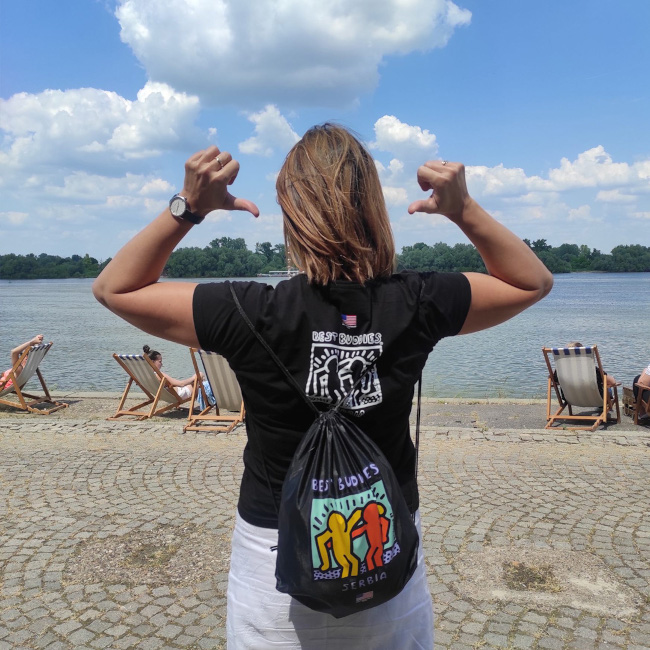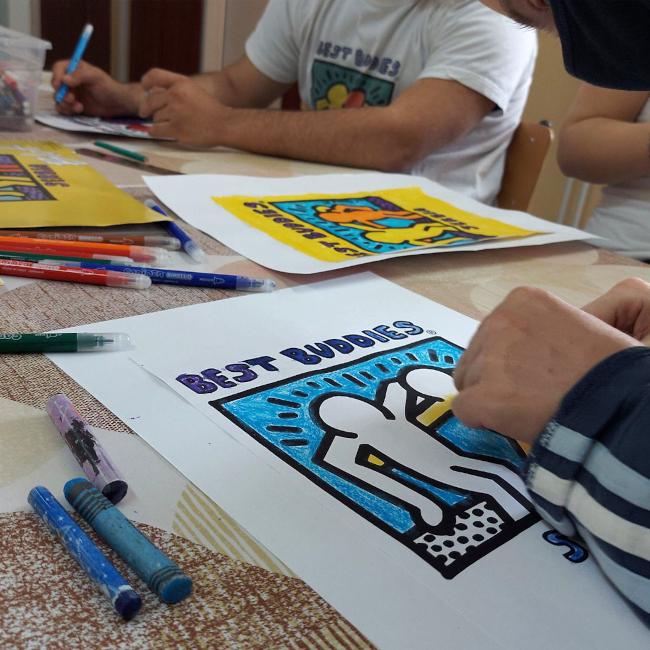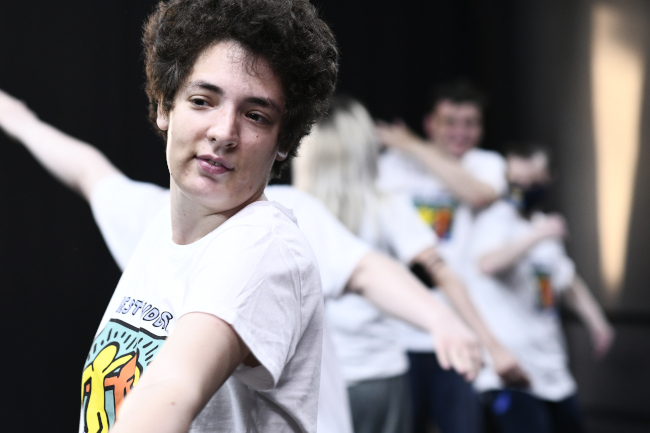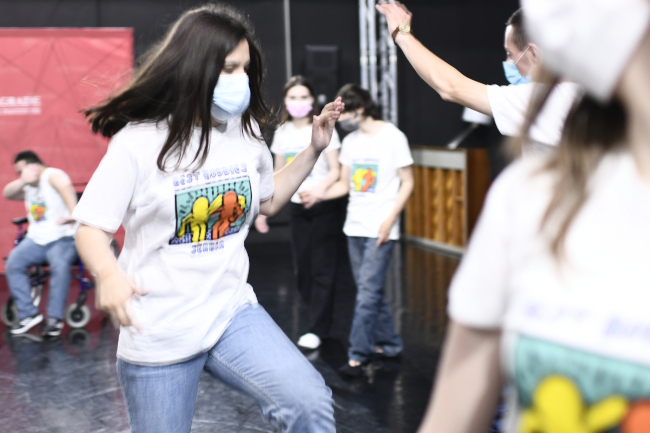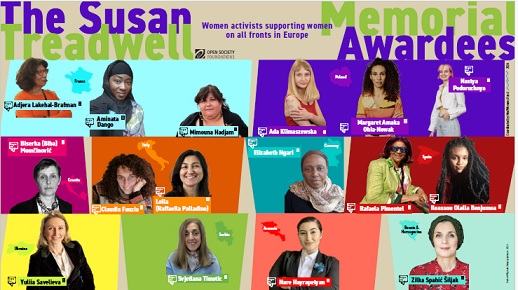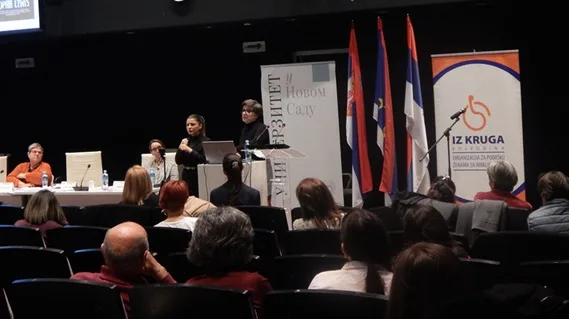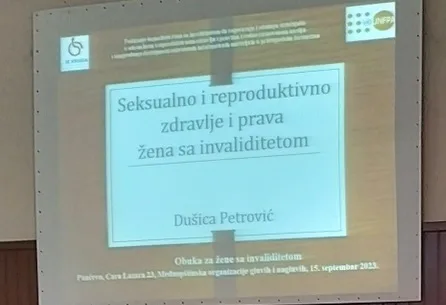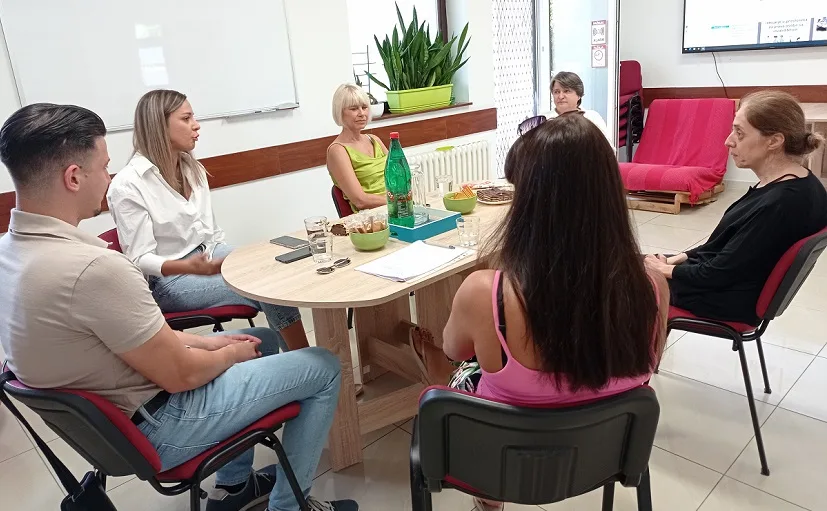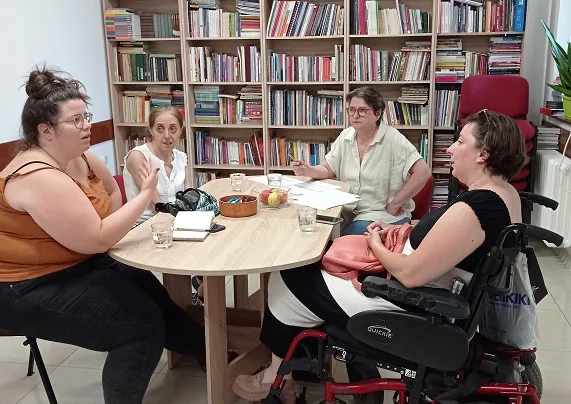Marijana Marjanovic is an executive director of Best Buddies Serbia and, at the same time, the president of the association for helping persons with Down Syndrome in Belgrade. She is a graduate economist with a full-time job in a private company, and a single mother of eleven years old twins, Victor and Theodora. Theodora has Down syndrome. For several years back, she has led the association and organized a number of projects: seminars for parents with guests from the region, Down Syndrome Week in Belgrade, training for a group of people with Down syndrome for waiter’s skills, a fashion show where models were persons with Down syndrome.
– Wanting to make something new for all children, regardless of the type of disability, and to apply good practices from the world, I made connections with the organization Best Buddies, which named me a director for Serbia – says for Disability Portal.
How did your engagement with Best Buddies start, and what motivated it?
– The motive to connect with the largest international organization for helping persons with developmental and intellectual disabilities arose from the need to help marginalized and hardly visible children in society and my child as well. To enhance their potential and self-esteem, spread the idea in the society, familiarize the general population with persons with developmental disabilities and break down prejudices about them.
The general population often sees persons with intellectual disabilities as eternal children in grown-up bodies, resulting in patronizing programs and activities not appropriate for their age, and ultimately – denying economic, social, and cultural rights and rights to sexual and partner relationships. How does the organization Best Buddies differ, and what are its guidelines?
– Indeed, a considerable part of support done for persons with intellectual disabilities is not suitable for their age. The problem is complex, and we cannot judge these activities because they bring joy and happiness into their lives and add some value. However, the development of persons with disabilities is the same as that of the general population. Hence in older age, it is not enough to organize solely, for example, art workshops, but we should deal with their lives essentially. As they grow up, they need to become part of the working population, cultural and social areas of life, and partner relationships, the same as the general population, but unfortunately, they are denied this. Our society is evolving in that sense, and I can say that the situation is much better compared to how it was 10-20 years ago. However, there is still plenty of room for improvement and solving complex problems, starting with help for the parents of children with developmental disabilities to upgrading life of grown-ups with developmental disabilities. Best Buddies Serbia is a non-profit organization that has been, for two years in a row, dedicated to making a network of volunteers enabling conditions for making friends among peers with and without disabilities for persons older than 16. It is the Best Friends program. It is a program of Best Friends. The programs Best Friends Serbia – Best Buddies Serbia help social integration via independent and autonomous expression by developing techniques and abilities that will contribute to it. The great problem children with developmental disabilities and their parents face is that after completing formal education, they leave the system and belong nowhere anymore. Loneliness, depression, regression in behavior and knowledge appear, and elderly parents have no more strength to help. It is a regrettable situation for not so few people and their families. For this reason, in addition to Best Friends program, Best Buddies Serbia has three more pillars of the mission: Self-advocacy, Integrated Employment, and Supported Independent Living.
In which Serbian cities do you implement programs? Do you work alongside existing organizations and associations of persons with intellectual disabilities?
– The pilot project covered just Belgrade. This year we have expanded to two additional regional centers, Novi Sad and Nis. We also implement the program Best Buddies there with the help of our program managers, who work on connecting persons with developmental disabilities with volunteers. We can proudly say that we have around sixty pairs in these three cities. Still, the demand is much higher, so I invite volunteers to join us and help with the fulfillment and implementation of the program and the parents to contact us and include their children in this fabulous program.
How does the program of building friendships work, considering the presumption that friendships are made spontaneously, without a plan or expectation, and not strategically, following the project?
– If we neglect the fact that it doesn’t matter who did you meet and where, but it is material what kind of communication you accomplished, and whether you continued to hang on, I can only say that there are people we meet by chance, but they are delightful, suit us, and we can be friends for a long time. That is how the project functions too. Based on predefined questionnaires, where, next to elementary data, the participants put down their specific interests, we pair them up. It appears programmed and staged, but during the first meeting, this barrier is overcome. Persons with disabilities have a pure heart; they form relationships without any calculation, and their feelings are sincere, so you can immediately see if they like someone or not. Additionally, the volunteers applied to the program because they wanted to help, so they would be ready to adapt and get to know their new buddy. Our organizing team periodically controls and checks how the relationship is moving on and whether there are any problems and solve them, so friendships can continue to develop without our support. Twice a month, we organize various workshops where they hang out and communicate, and after a while, we all feel like a big friendly family.
Who can be the Best Buddies volunteer? What experience, prior knowledge, or personal affinities should that person have? What criteria do you apply when choosing them?
– A volunteer should be a person with highly developed empathy, cheerful, and not afraid of the challenges appearing when socializing with persons with developmental disabilities; an outgoing person who likes to explore and uncover new potentials. Previous experience in working with persons with disabilities is desired, but not essential.
Can it be that a volunteer behaves according to the model of mercy, meaning: I am taking you to coffee because I am a generous benefactor and not because I honestly enjoy the time we spent together?
– We don’t consider it in such a manner. We are Best Buddies, and best buddies do nothing out of interest but out of love.
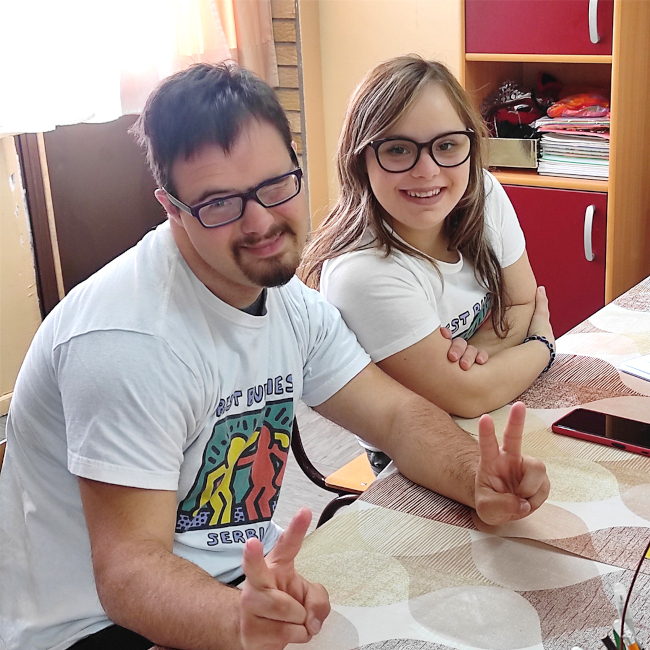
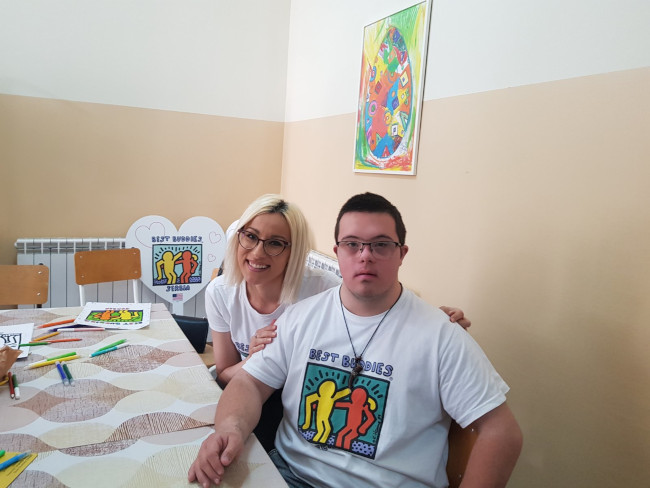
I assume that the main idea is not to maintain built friendships as an isolated oasis, but they should help young people with disabilities incorporate into broader social happenings. How can that happen?
– Quite right. For this reason, we try to connect with various friendly partner organizations that invite us as guests and include our children in activities organized for the general population. Last Saturday, for example, we were guests of the Center for the Promotion of Science on the manifestation – May The month of Mathematics. In the rooms of Silosi Belgrade at Dorcol, they organized interactive games that showcase applied mathematics in an entertaining way. This meeting was diversely useful and fun, and other visitors could meet us and hang out with our children.
According to your experience to date, what are the greatest enemies of building an inclusive society?
– As greatest enemies, I would name a slow bureaucratic system that exhausts parents of children with disabilities trying to fulfill their legal rights; lack of information; society’s disinterest in the children with developmental disabilities; low visibility of this population. All of these contribute to discrimination in many aspects of life and unawareness of differences and their benefits.
Tell us something about the integrated employment program.
– The integrated employment program is one of The Best Buddies’ Mission’s pillars, and it means looking for a job for persons with developmental disabilities. They can have work engagement with the help of a personal assistant. In the first phase of the program, we train persons with developmental disabilities on how to do a work interview, what to say, how to introduce themselves. Simultaneously, we are working on finding companies interested in their employment and the education of employees to prepare the work environment for a newcomer. A mentor accompanies a person with a developmental disability, also serving as a mediator between an employee and an employer. He provides safety, not just to the employee, who in that way has someone familiar in the work environment, but to the employer too, in an educational sense, teaching them how to handle everyday situations. A mentor can be an escort for a month, two, or six months, depending on the need, and until an employee feels secure and stable in the new environment. Hopefully, this program will be recognized by the potential donors and seen as a chance, both business and human, and we can commence it in Serbia.
What employment opportunities do young people with intellectual disabilities have in Serbia, and what can we do to improve their employability?
– It is a complex question, i.e. it envelops many aspects. Starting with the parent’s wish to provide the possibility of employment, the child’s preparedness for that move, and the system’s adaptability to different people, to financial cost-effectiveness compared to social funding. The very idea of Best Buddies International, which I mentioned as a concept of employment in various countries because Serbia is the sixtieth country that is part of the Best Buddies family, seemed to me an example of good practice that I could apply in our country and contribute to better life and satisfaction of people with a developmental disability.
Best Buddies is working on developing leadership skills and self-advocacy skills worldwide. Do you have any feedback about visible results or changes this program has caused? When and how could this program come into being in Serbia?
– In the self-advocacy program, we do pieces of training for persons with developmental disabilities to build up their confidence and personal presentation skills to a broader audience. It is a practical piece of training to teach them to speak for themselves or a particular group of people because they will express what they need better than having us speak for them. In this way, they rehearse for the potential interview with a prospective employer. At each of our online workshops, we encounter comparative experiences from the USA and Serbia. Also, there are opportunities to hear the ambassadors of the Best Buddies program. The ambassadors are persons with developmental disabilities that have completed the self-advocacy program, thus becoming ones. They speak for themselves and in the name of the whole community and their friends who may be nonverbal or have a problem communicating, talk about their issues and make their voices heard at public conferences and live appearances. This program is linked to the employment program, so I hope henceforward we will apply it in Serbia. The need certainly exists; we have human capacities, and we only lack a permanent source of financing that will recognize the real value of the program we are working on.
Deinstitutionalization has been a widespread topic in recent years, although we are far from systematic reform. One of the Best Buddies programs is an assisted living program. Where is Serbia in relation to the world on this issue?
– Regrettably, this is a very delicate matter that needs to be approached systematically from several aspects. Assisted living is possible if dealt with it systematically. At present, there are only individual cases from different cities in Serbia. Assisted independent living is the fourth pillar of the Best Buddies mission. It implies creating conditions for the independent living of persons with developmental disabilities. Support is necessary for this phase of their life, too, to conceive partnership relationships, separate from their parents, and live their own lives as much as it is possible. Hopefully, we will be able to develop all four pillars of the Best Buddies mission in the future, which would, with sufficient financing, bring a range of benefits to persons with developmental disabilities and their families. All parents have a dream to show their children the right path in life and to be independent. Nobody wants them to become a social case invisible to the system as they grow up.
Photos: Best Buddies Serbia
Translated by: Suzana Belos
